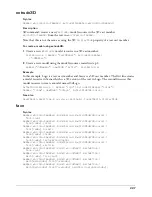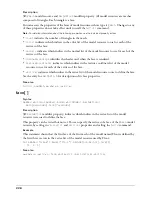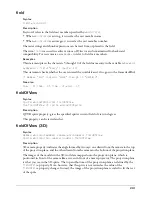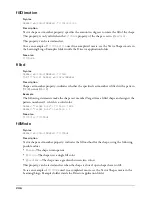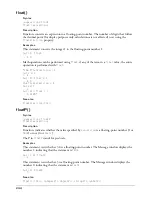
241
Example
The following handler adjusts the frame rate of a Flash movie sprite. As parameters, the handler
accepts a sprite reference, an indication of whether to speed up or slow down the Flash movie, and
the amount to adjust the speed.
on adjustFixedRate whichSprite, adjustType, howMuch
case adjustType of
#faster:
sprite(whichSprite).fixedRate = sprite(whichSprite).fix howMuch
#slower:
sprite(whichSprite).fixedRate = sprite(whichSprite).fixedRate - howMuch
end case
end
See also
playBackMode
fixStageSize
Syntax
the fixStageSize
Description
Movie property; determines whether the Stage size remains the same when you load a new movie
(
TRUE
, default), or not (
FALSE
), regardless of the Stage size saved with that movie, or the setting
for the centerStage.
The
fixStageSize
property cannot change the Stage size for a movie that is currently playing.
This property can be tested and set.
Examples
The following statement determines whether the
fixStageSize
property is turned on. If
fixStageSize
is
FALSE
, it sends the playhead to a specified frame.
if the fixStageSize = FALSE then go to frame "proper size"
This statement sets the
fixStageSize
property to the opposite of its current setting:
the fixStageSize = not the fixStageSize
See also
centerStage
flashRect
Syntax
member(
whichVectorOrFlashMember
)
.
flashRect
the flashRect of member
whichVectorOrFlashMember
Description
Cast member property; indicates the size of a Flash movie or vector shape cast member as it was
originally created. The property values are indicated as a Director rectangle: for example,
rect(0,0,32,32).
For linked Flash cast members, the
FlashRect
member property returns a valid value only when
the cast member’s header has finished loading into memory.
Summary of Contents for DIRECTOR MX-LINGO DICTIONARY
Page 1: ...Lingo Dictionary Macromedia Director MX...
Page 756: ...Index 756...

